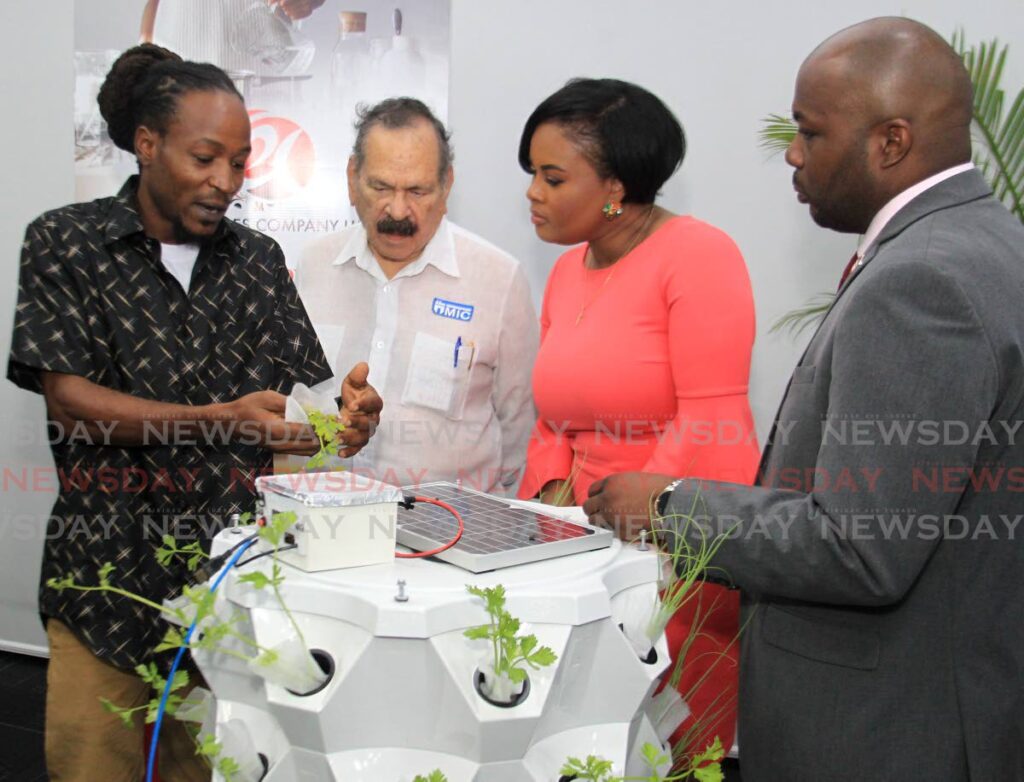Hydroponics trainee: 'I want to be a commercial farmer'

The signing of a memorandum of understanding between the MIC Institute of Technology (MIC-IT) and the Export Centres Co Ltd (ECCL) will see ongoing collaboration between the two institutions in training people in using hydroponics systems.
Speaking at the signing ceremony at the MIC-IT head office in Trincity on Wednesday, hydroponics trainee and graduate Isaac Grant said completing this course gave him a further step up in his ambition to move from being a home farmer to being a commercial farmer.
“I always viewed farming as a business, but my ability to become successful is limited by my ability to obtain assets and the capital which would be needed to attain this goal. The training offers a mandatory business and entrepreneurship segment to help us know how we may gain funding for our farms and utilise the funds to succeed. I’m now more confident in my ability to produce crops more efficiently, safely, and profitably.”
He said the knowledge gained during the course has also helped him with his current job as a quality assurance worker at Blue Waters.
“My goal now is to gain the needed capital investment and put my farming skills to use, as learned in hydroponics class. I have goals and dreams of having my own hydroponics farm to plant exotic and exclusive crops to establish myself in the nations markets and supermarkets. I believe the knowledge we gained in the hydroponics course in terms of more efficient and alternate ways of farming is the real way to the future of farming.”
Grant said he hoped many more people would benefit from this A-class training.
MIC-IT CEO Anil Ramnarine said the institution was proud to be able to offer top quality technical and vocational training to the people of TT, and give the trainees real world experience in their chosen careers.
MIC-TT chairman Prof emeritus Clement Imbert said ECCL has contracted MIC-IT to carry out this and other courses, and he looked forward to further development of a symbiotic relationship between the two organisations, which he said could learn a lot from each other. He appealed to the Finance and Education Ministers to increase the allocation for the institution, as he said keeping international accreditation was expensive.
ECCL chairman Roger Roach said in developing the hydroponics course, the institution realised that the skills taught in the decades-old PVC furniture course could be repurposed to enable craft artisans to build hydroponics systems and approached MIC-IT to do the training. He said hydroponics is described as the art of gardening without soil.
“The ability to grow our own food is of paramount importance, and the opportunities that are available for agricultural entrepreneurs are endless. Twenty-five trainees completed the introductory stage of the pilot programme in December 22, and 25 trainees are currently engaged in the intermediate level. No dropouts, and the trainees should be congratulated. Our goal is to produce 25 hydroponics entrepreneurs, who will harness the skills, techniques, and technology, and turn it into an income-generating opportunity and form sustainable businesses.”
He said hydroponics systems are used by hobbyists, small-scale, and commercial farmers, so trainees could choose what level they wanted to go to.
“Hydroponics systems are 90 per cent more water efficient than soil-based farming, production increases three to ten times in the same amount of space, many crops can be produced twice as fast in a well-managed hydroponics system. Additionally, the trainees are receiving free entrepreneurial training from Nedco (National Entrepreneurship Development Co), free e-commerce training from ECCL, and free training on how to find, identify, and use sustainable and eco-friendly raw materials in their production process.”
Roach said the next step was to identify funding in order to provide assistance and mentorship for the trainees once the programme was completed. He said further discussion is needed to arrive at a policy decision.
Education Minister Dr Nyan Gadsby-Dolly said the partnership between the two organisations can only redound to the benefit of the people of TT.
Sport and Community Development Minister Shamfa Cudjoe commended the trainees on completing the first programme and all moving forward to the intermediate stage of the course.
“We were wondering what to do with the old PVC course, and ECCL found people who had the knowledge to create something like a Lego that snaps together and create a whole system that is powered by old batteries from your laptop put together to create a battery pack which has to be renewed every four years.
“It’s a neat way of preserving the PVC programme and using a clean technology for a sustainable way of planting and teaching communities, including school children to grow 40-80 plants in a small space. I’m happy to see that programme revived, especially in light of the Best Village Grow Your Own Food programme which we started a few years ago, where we visit people’s farms and places where they grow food and now you can grow it in your gallery and out your kitchen window.”


Comments
"Hydroponics trainee: ‘I want to be a commercial farmer’"